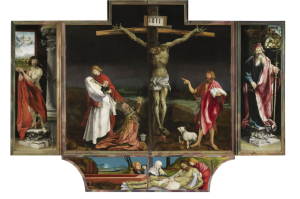Opening Activity Part 1
Set Up: As you gather with people, have a jar of gummy worms and a jar of honey at each table being used for this activity. Hand out at least two gummy worms, if not more, and preferably blue in keeping with the Advent season. The jar of honey is only for decoration purposes, reminding everyone of John the Baptist’s meal of honey with locusts.
Invite all participants to think of each gummy worm as a physical reminder of something that they have done over which they feel grubby. They do not have to share what these are. Remind them that we are all human, make mistakes, and need to reassess our words and actions. Some examples could be:
- a mean word shouted at someone
- a nasty comment left on social media
- not sharing from our abundance
- holding ill-will towards those who are different
Remind all the participants that these grubby feelings and actions are a part of what makes us messy humans. It is important, then, that we accept that we have made mistakes and will continue to make mistakes in the future. When we do, we will feel grubby again and again. Instead of being afraid to come to terms with our words and actions, our faith teaches us to face them head-on, make amends, and choose a different future.
Read Text Aloud
Rest as Repentance
This gospel lesson reminds us that the holiday season is not simply about beautiful lights and presents. Our faith tradition also invites us to pause, reassess our words and actions, and take corrective action. Amid cheerful music and tinsel-covered trees, we hear the strong words from John the Baptist:
“Repent, for the kingdom of heaven has come near.” … “You brood of vipers! Who warned you to flee from the coming wrath? Therefore, bear fruit worthy of repentance …” (Matt. 3:2, 7b-8a)
In not mincing words, John the Baptist firmly invites us to reconsider what it means to live as messy humans all the while claiming to be followers of God. He is inviting us into repentance as part of what people of faith are called to practice.
According to the likes of the Apostle Paul, Saint Augustine, and Martin Luther, sin is selfishly turning inwardly into one’s own self. Adversely, Repentance is generously turning outwardly towards God and the neighbor.
Repentance looks like letting go of our angry comments, setting aside our selfishness, and then choosing to be kinder, more generous, and open to what God might want us to do. In a seemingly strange way that can only be experienced by those who choose this path, repenting allows us to rest.
Through repentance we are freed from anger, selfishness, and hatred. In repenting and bearing new fruit, we taste the sweetness of what being a follower of Jesus is and can be for us in this world.
In my context (Minneapolis, MN), many of my beloved neighbors are being demonized. Angry, selfish words have been shared from the highest levels of power. This implicates all of us, whether we agree with the words or not, because we are all a part of this society. The prophet John is inviting us to remember that, as people of faith, we need to repent. What will it look like for us to set aside the angry, selfish words put forth by our leaders so that we can rest in the sweetness of a new way?
Opening Activity Part 2
Focus on how important it is to remember that we are not broken, but simply human. And that even in our biggest mistakes we are still beloved children of God. Not only that, but we will continue to make mistakes (big ones and small ones) over and over again. However, as people of faith, we are asked to always be reassessing our words and actions, make amends, and choose a different future.
This is the way that God invites us into deep rest. Repentance actually frees us from the words, actions, and feelings that often weigh us down. Repentance is a sweet gift from God who understands (and loves) the humans God created.
- What does repentance look like for Jesus followers today?
- Once again, think about the words, actions, and/or feelings that are making you feel grubby today.
- Remind them that, even in our deepest mistakes, God still loves us. However, as people of faith, we have the sweet release of repentance.
- Finally, invite participants to silently set aside their angry thoughts, words, and actions. Then, lead them in a prayer of repentance such as:
“Most merciful God, we confess that we are captive to sin and cannot free ourselves. We have sinned against you in thought, word, and deed, by what we have done and by what we have left undone. We have not loved you with our whole heart; we have not loved our neighbors as ourselves. For the sake of your Son, Jesus Christ, have mercy on us. Forgive us, renew us, and lead us, so that we may delight in your will and walk in your ways, to the glory of your holy name. Amen.”[1]
Closing Activity
Invite all participants to think about how they might make amends and/or choose a different future way of speaking, acting, thinking, or feeling.
If anyone is comfortable sharing their thoughts, have them do so. If not, share that they can talk to a pastor, deacon, or lay leader so that they can come up with plans for amends privately.
Remind them that repentance is not to shame us for being human, but it is a sweet release that allows us to rest. It is also a part of what we are called to do as people of faith, especially during the Season of Advent.
Ending Prayer
It is very important that the pastor, deacon, or lay leader speak the words of forgiveness to everyone who has participated. They may choose to say:
“God, who is rich in mercy, loved us even when we were dead in sin, and made us alive together in Christ. By grace we have been saved. In the name of + Jesus Christ, our sins are forgiven. Almighty God strengthen us with power through the Holy Spirit, that Christ may live in our hearts through faith. Amen.” [2]
Immediately after this, invite all participants to eat their gummy worm(s) and enjoy the sweetness of repentance as they rest in God’s forgiveness.
[1] Evangelical Lutheran Worship, pg. 95
[2] Evangelical Lutheran Worship, pg. 96, edited.
Bio
David Larson-Martínez is a consecrated deacon of the Lutheran Diaconal Association and an ordained pastor serving at Holy Trinity Lutheran Church in Minneapolis, MN. A graduate of Valparaiso University and Luther Seminary, he grew up in Cuernavaca, Mexico and now happily calls the Twin Cities home. David treasures his large cross-border family—his mom, five siblings, and a growing crew of nieces and nephews who live in both Mexico and the United States.




